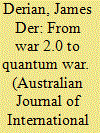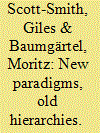| Srl | Item |
| 1 |
ID:
123782


|
|
|
|
|
| Publication |
2013.
|
| Summary/Abstract |
As information networks catalyse local incidents into international crises, as global events appear and disappear on multiple screens at an accelerated pace and as a war of images displaces the image of war, it becomes increasingly difficult to understand the rapidly changing nature of global violence within the confines of security studies. Phase-shifting with each media intervention from states to sub-states, local to global, public to private, organised to chaotic and virtual to real-and back again-global violence superpositions into a quantum war that requires new transdisciplinary, transnational and transmedial approaches.
|
|
|
|
|
|
|
|
|
|
|
|
|
|
|
|
| 2 |
ID:
105360


|
|
|
|
|
| Publication |
2011.
|
| Summary/Abstract |
As Obama took office at the beginning of 2009, several new figures attained important advisory positions in his administration. Anne-Marie Slaughter, former Dean of the Woodrow Wilson School at Princeton University, and now Director of Policy Planning in the State Department, is a prime example of the 'change' that has come to Washington. In recent years she has been part of a growing academic circle that views networks at the centre of international relations. At the same time, she has promoted the idea that the United States can be 'the most connected country' in such a world. By taking a closer look into the discourse of US supremacy and the current state-of-the-art in the theory of transnational networks, this article reveals the divergence between wishful thinking and reality in Slaughter's position. By analysing her position and introducing three case studies, we conclude that the complexity of power relations in a world of networks makes any assumption of US supremacy highly problematic. Some might 'mirror' the beliefs and values of America (Open Society Institute); some might only be a 'prism' of various different voices (Al-Jazeera); and some might fall totally outside state control to form 'shadow networks' (Khan Network). Ultimately, it is the belief in US exceptionalism that perpetuates the claim that the United States has 'an edge' in such a world, with potentially problematic consequences.
|
|
|
|
|
|
|
|
|
|
|
|
|
|
|
|